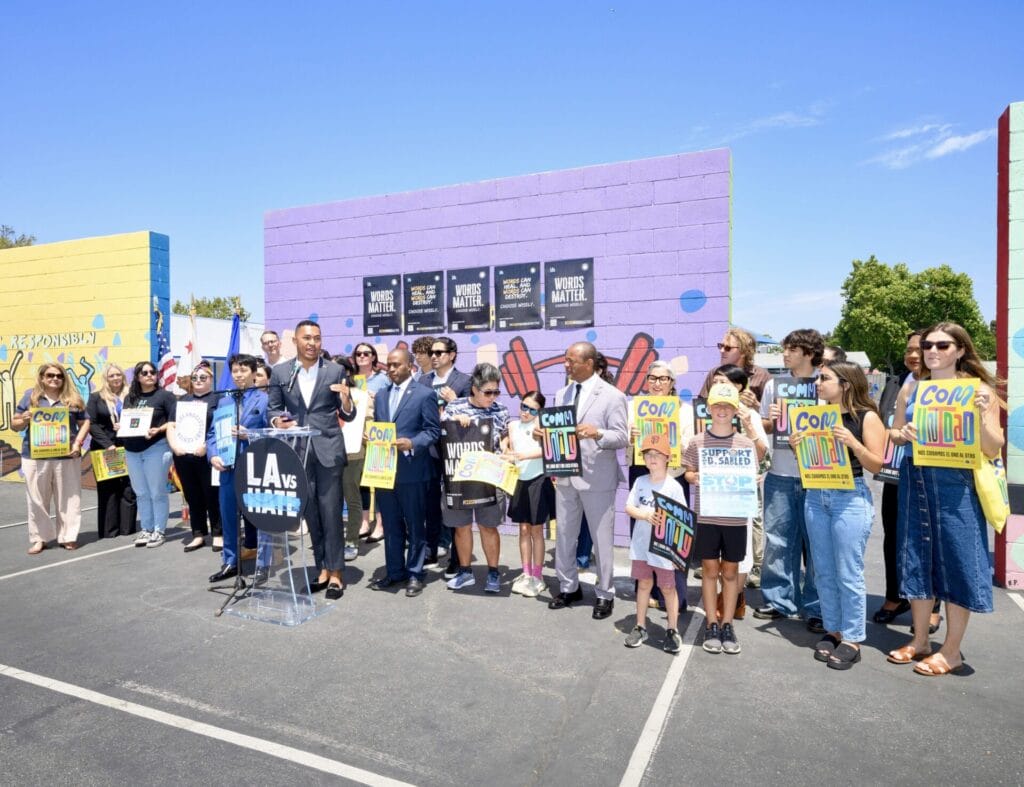Note: The comments made by school board members in this piece reflect only their personal opinions and views, and are not necessarily reflective of their respective school boards / districts.
Education is seemingly one of the most non-controversial topics. Who among us doesn’t want kids to learn and grow in a safe and welcoming environment? Yet disagreements about what exactly constitutes a “good education” have spurred decades of debate in the U.S., especially around the possible benefits of alternative options to public schools like homeschooling, private schools, and charter schools. There is, however, another option for helping shape the direction of public education from within – the role of the school board and its elected members.
These conversations hit an inflection point in 2020 with the onset of the COVID-19 pandemic. As so-called “parents’ rights” groups began to organize around a variety of hot button issues, such as opposition to vaccine requirements and classroom mask policies, public school enrollment began to drop for the first time since 2016.
Parents whose children remained enrolled in the public school system felt emboldened to take a more hands-on approach to their children’s education, including objections to classroom content that reflected realities such as increasing acceptance of LGBTQ students and families, and discussions of race and racism. Groups with national anti-LGBTQ organization funding like the so-called Moms for Liberty claimed “parents rights” to push for anti-LGBTQ and anti-DEI policies and removal of inclusive books and materials at school libraries attempted to control individual school districts and boards to determine what is best for all students and communities.
“School boards are a critical battleground for LGBTQ+ rights especially for youth where policy debates governing self expression, identity, curricula, extracurricular activities, and more impact the daily lives of LGBTQ+ students and their families. Championing equitable representation in school boards is vital to counteract groups like Moms for Liberty and its extreme right influence on classrooms and school districts nationwide, and ensures all students, especially LGBTQ+ students, can feel safe, thrive and be affirmed,” said Elliot Imse, Executive Director of the LGBTQ+ Victory Institute, which works to build and support LGBTQ leaders in public office.
GLAAD’s ALERT Desk, which tracks anti-LGBTQ incidents across the U.S., has noted that as anti-LGBTQ rhetoric hones in on public school education, hate and harassment targeting school board members also begins to rise. In 2023, GLAAD tracked 35 anti-LGBTQ incidents targeting school boards. In 2024, that number grew to 57. By the end of August 2025, GLAAD had already documented 48 incidents. If this trend holds steady, the U.S. is on track to see an estimated 72 incidents by December 2025, marking a potential 106% increase in hate and harassment targeting school boards over LGBTQ-inclusive curricula from just two years prior.
Diving deeper into the data, the ALERT Desk found that the majority of incidents specifically revolved around the rights of transgender students. Last month, for example, the San Mateo Union High School District board meeting in California brought out a number of speakers from out of state and national organizations that fight transgender equality to protest inclusive sports and facilities policy. The majority of these speakers had no children in the district, yet took over the public comment period to sway the board to remove protections for transgender students. Participation in sports is linked to numerous health benefits for youth but especially LGBTQ youth, including improved self-esteem, lower levels of depression, and greater school belonging. Research shows schools that welcome transgender students to participate in sports also have higher levels of participation among cisgender (non-transgender) girls.
In Northern Virginia, Republican gubernatorial candidate Winsome Earle-Sears and candidate for Lt. Governor John Reid appeared outside of two Arlington and Fairfax County school boards in September. Neither have children enrolled in either school district, but chose to campaign outside the board meetings to oppose the districts’ trans-inclusive bathroom policies. Earle-Sears, who has a long record of policies and statements against LGBTQ equality, falsely claimed that transgender and nonbinary youth don’t exist, and therefore schools don’t need policies to support gender non-conforming youth. Research shows human biology is complex and that sex and gender diversity has existed throughout history and cultures, and that transgender youth are at greater risk of assault at school including the school bathroom.
A small handful of parents in Maryland, in one of the most diverse counties in the U.S., went to the Supreme Court to demand the right to opt out of public school classrooms that had picture books of LGBTQ people and families. The court issued a preliminary injunction in the case Mahmoud v. Taylor, overruling democratically elected school boards and voters. The district must now notify parents in advance when books with similar themes will be used in class. Justice Sonia Sotomayor’s dissent noted, “The majority’s myopic attempt to resolve a major constitutional question through close textual analysis of [a book about a little girl attending her uncle’s wedding to his husband] also reveals its failure to accept and account for a fundamental truth: LGBTQ people exist. They are part of virtually every community and workplace of any appreciable size. Eliminating books depicting LGBTQ individuals as happily accepted by their families will not eliminate student exposure to that concept.”
Book banning and opt out tactics of groups claiming to represent the “rights of parents” (that mostly ignore the rights of LGBTQ parents, parents of LGBTQ students, and parents of color) are actually quite unpopular with most parents. The American Library Association found that 71% of voters, including 75% of Democrats and 70% of Republicans, oppose efforts to have books removed from their local public libraries and believe that the librarians do a good job offering books with diverse viewpoints, with similar findings occurring in evaluating book bans in school libraries. Another poll from Gallup in 2024 showed that 70% of U.S. parents of K-12 students are either completely or somewhat satisfied with the education that their oldest child is receiving.
Replacing Division with Strength
To learn more about what everyday people can do to ensure their community schools reflect and represent all families accurately and inclusively, GLAAD sat down with three out school board members who receiving support from of the LGBTQ+ Victory Institute to hear how they are navigating the challenges of today’s political climate and creating a welcoming atmosphere for all students.

“At the local level, we’ve seen the ripple effects of national anti-trans rhetoric — families bring those fears to board meetings, and students hear that language on social media and in their communities,” said Triston Ezidore, President of the Culver City Unified School District in California. “While California state policy is generally affirming, that external pressure creates a chilling effect. Our responsibility as a board has been to ensure that our district remains a safe haven. That has meant reaffirming our commitment to trans-inclusive policies, ensuring staff are trained on respecting names and pronouns, and standing firm when political pressure tries to undermine the rights of our students.”
Ellie Krug, an elected board member for a Midwestern school district, spoke to these concerns as well. Following the horrific school shooting in Minneapolis in August, Krug stated, “Our fear now is how the tragedy will be used by MAGA to take extraordinary measures against trans people.” But Krug says, “This is why I MUST SHOW UP. I think it’s incredibly important for our queer students and their families, educators and administrators to know that I’m on the board. They have seen the trial attorney in me come out when certain topics or subjects affect or threaten queer kids and their families. It also means that even if I’m afraid, I can’t show it publicly. I need to lead and I plan to do exactly that.”

In Texas, one school board member wants to show that queer and trans youth can and will thrive in the South. “I can’t speak for the whole board, but in my time serving, I haven’t seen the kind of flashpoint debates that make national news. I’ve been on the board for almost ten years, and for the last seven I’ve served openly as a gay trustee,” says Juan Miguel Arredondo, a trustee on the San Marcos CISD board. “I haven’t seen people in San Marcos get caught up in that kind of [anti-LGBTQ] rhetoric. There hasn’t been a push for book bans or attacks on trans kids. Our conversations are about how to strengthen academics, support extracurriculars, and make sure schools are welcoming to everyone.”
When asked how the board members effectively organize for change, Ezidore offers one possible roadmap. “First, anchor everything in the students. It’s harder for opponents to argue against protections when you make clear that these policies are about keeping young people safe and supported. Second, build coalitions — with parents, teachers, community organizations, and local officials. That network matters when tough votes come up. Finally, don’t let fear dictate your leadership. Even when the climate is hostile, students are watching how adults respond. Standing firm communicates that their rights are non-negotiable.”
“Organize and be persistent,” Krug says. “When I ran for school board in 2022, there were 12 candidates vying for four seats. Victory Fund gave me incredibly important advice about door knocking three months before the election. I started doing that Labor Day weekend. It was incredibly difficult for me since I’m really an introvert and because I don’t pass due to my masculine voice – I just didn’t want to get ‘the look’ people often give me when meeting me for the first time. But I did it. I knocked on somewhere between 1000 and 1500 doors. It made all the difference in the world, and when the votes were tallied, I came in 3rd, right after the two incumbents.”

“It comes down to trust,” Arredondo adds. “Our community trusts us as elected officials because we’ve shown, time and again, that we’ll do what’s best for students, staff, and parents. These are our neighbors, and we owe it to them to keep the focus there. San Marcos CISD has become a lifeline for so many families and a trusted community partner because, at my urging, we chose to go above and beyond when our community needed us most. During the pandemic we delivered meals, offered curbside meal service, distributed hotspots and laptops so students could keep learning, and our staff found creative ways to check in on kids who were struggling. During Winter Storm Uri, I pushed for us to use our buses as mobile warming centers. Later, when vaccines became available, I advocated for our schools to serve as vaccination sites, and we even administered vaccines at football games so families could access them easily.”
“That’s what grounds our work. If you keep that mindset, you can navigate tough conversations and keep your community together.”
—
The data shows that these approaches are gaining momentum. Groups like Moms for Liberty (M4L) are beginning to lose their influence at the polls, with M4L-backed school board candidates going from winning 55% of races in 2022 to 43% in 2023, and further solidified by a stunning defeat in their Florida stronghold in the 2024 school board elections. Meanwhile, the LGBTQ+ Victory Institute tracked 75 out school board candidates in 2024, and endorsed 43 through the Victory Fund – 25 of which won their races (a 58% win rate).
In the words of Kyrstin Schuette, Founder and Executive Director of the School Board Integrity Project, “When voters are given real choices and accurate information, they consistently reject extremism. Recent data shows that progressive school board candidates are winning at high rates across red, blue, and purple communities because the values they champion aren’t partisan. They’re American.”













